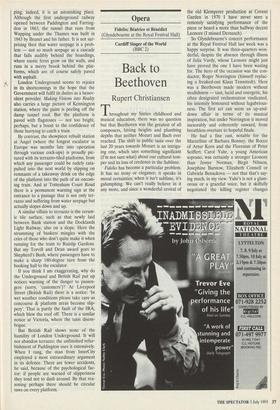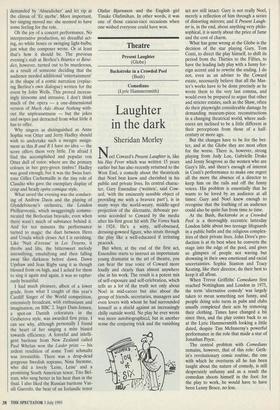Opera
Fidelio; Beatrice et Benedict (Glyndebourne at the Royal Festival Hall)
Back to Beethoven
Rupert Christiansen
Throughout my Sixties childhood and musical education, there was no question but that Beethoven was the greatest of all composers, hitting heights and plumbing depths that neither Mozart and Bach ever reached. The shift in public taste over the last 20 years towards Mozart is an intrigu- ing one, which says something significant (I'm not sure what) about our cultural tem- per and its loss of credence in the Sublime.
Fidelio has become a particular problem. It has no irony or elegance; it speaks in moral certainties; when it isn't sublime, it's galumphing. We can't really believe in it any more, and since a wonderful revival of
the old Klemperer production at Covent Garden in 1970 I have never seen a remotely satisfying performance of the piece or heard a more than halfway decent Leonore (I missed Dernesch).
So Glyndebourne's concert performance at the Royal Festival Hall last week was a happy surprise. It was three-quarters won- derful, despite the absence through illness of Julia Vardy, whose Leonore might just have proved the one I have been waiting for. The hero of the occasion was the con- ductor, Roger Norrington (himself replac- ing a freaked-out Klaus Tennstedt). Here was a Beethoven made modern without modishness — taut, lucid and energetic, his often denigrated orchestration vindicated, his intensity honoured without lugubrious- ness. The first act can seem an up-and- down affair in terms of its musical inspiration, but under Norrington it moved inexorably and coherently onward, from breathless overture to hopeful finale.
He had a fine cast, notable for the Marzelline of Barbara Bonney, the Rocco of Artur Korn and the Florestan of Peter Seiffert. Carol Yahr, a young American soprano, was certainly a stronger Leonore than Jessye Norman, Birgit Nilsson, Josephine Barstow, Elizabeth Connell or Gabriela Benackova — not that that's say- ing much, in my view. Yahr's is not a glam- orous or a graceful voice, but it skilfully negotiated the killing register changes demanded by `Abseulicher' and let rip at the climax of 'Er sterbe'. More important, her singing moved me: she seemed to have some feeling for the role.
Oh the joy of a concert performance. No interpretative production, no dreadful act- ing, no white boxes or swinging light-bulbs; just what the composer wrote. Or at least that's how it should be. The previous evening's stab at Berlioz's Beatrice et Bine- dict, however, turned out to be murderous, as a result of someone deciding that the audience needed additional 'entertainment' in the shape of a comic narration (replac- ing Berlioz's own dialogue) written for the event by John Wells. This proved increas- ingly tiresome and intrusive. I don't think much of the opera — a one-dimensional version of Much Ado About Nothing with- out the unpleasantness — but the jokes and swipes just detracted from what little it has to offer.
Why singers as distinguished as Anne Sophie von Otter and Jerry Hadley should wish to undertake such a meagre assign- ment as this B and B I have no idea — the score offers them very little. I'm afraid I find the accomplished and popular von Otter dull of voice: where are the primary colours in her grey-green timbre? Hadley was good enough, but it was the Swiss bari- tone Gilles Cachemaille in the tiny role of Claudio who gave the exemplary display of crisp and heady opera comique style.
What saved the evening was the conduct- ing of Andrew Davis and the playing of Glyndebourne's orchestra, the London Philharmonic, which swaggeringly commu- nicated the Berliozian bravado, even when there wasn't much of substance behind it. And for ten minutes the performance turned to magic: the duet between Hero and Ursula which closes Act I is ravishing. Like `Nuit d'ivresse' in Les Troyens, it throbs and lilts, the bittersweet melody intensifying, emulsifying and then falling away like darkness before dawn. Dawn Upshaw and Jean Rigby sang it as though blessed from on high, and I ached for them to sing it again and again, it was so raptur- ously beautiful.
I had much pleasure, albeit of a lower grade, from what I caught of this year's Cardiff Singer of the World competition, extensively broadcast, with enthusiasm and imagination, on BBC 2. Inger Dam-Jensen, a spot-on Danish coloratura in the Gruberova style, was awarded first prize. I can see why, although personally I found the heart of her singing a mite biased towards efficiency. A forceful and intelli- gent baritone from New Zealand called Paul Whelan won the Lieder prize — his ardent rendition of some Tosti schmaltz was irresistible. There was a drop-dead gorgeous Swedish soprano, Nina Stemme, who did a lovely `Leise, Leise' and a promising South American tenor, Tito Bel- tran, who sang better in his heat than in the final. I also liked the Russian baritone Vas- sili Guerelo, the bear of an Icelandic tenor
Olafur Bjarnason and the English girl Tinuke Olafimihan. In other words, it was one of those caucus-race occasions when one wished everyone could have won.



















































 Previous page
Previous page